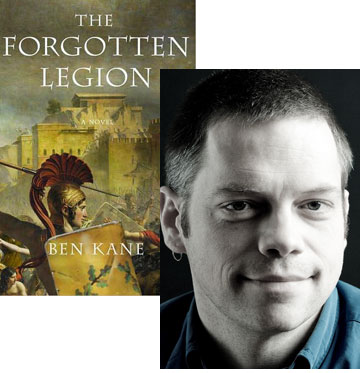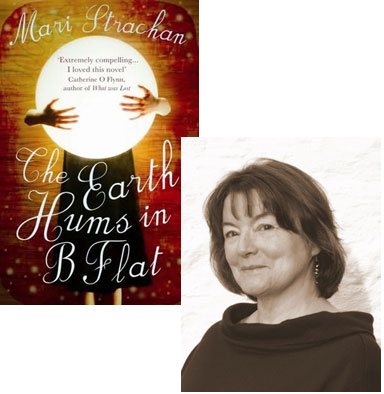Ben Kane: From the Vet’s Office to the Roman Battlefields

For some reason, this month has seen a boom in novels about the Roman Empire from St. Martin’s Press. There’s Harry Turtledove’s Give Me Back My Legions, Russell Whitfield’s Gladiatrix, and The Forgotten Legion, the debut novel from Ben Kane. Kane’s path to writing the first volume in an military historical trilogy is a great example of how a dedicated writer will find the time to write no matter what else is going on in his or her life, and I invited him to share his story with you.
I’ve been a veterinarian for nearly seventeen years now. Like many people who dream of such a career, I started off with a childhood love of animals. Dogs, cats, rabbits, cows—as a boy, it didn’t matter to me. Discovering the gentle, life-affirming James Herriot books helped build up a mental image of being a “doctor for animals,” as did the fact that my dad was already in the profession. Alongside my love of all creatures great and small ran a deeply rooted love of history. Don’t ask me where it came from, but I devoured any book I could find about the Romans, the Vikings, the Crusades, the Napoleonic wars, World Wars One and Two—in fact any conflict at all! I still ended up putting veterinary medicine number one on my university application form though. The main reason, from what I can remember, is that although I loved history, I couldn’t see myself as a teacher. There was certainly no concept in my mind of being a writer.
As with most people starting out on a career, my job as a veterinarian took over my life. Straight out of college, I worked in ‘mixed’ practice for nearly three years, which meant dealing with cattle, sheep, horses, dogs and cats. Stints in purely ‘small animal’ and ‘exotic’ (snakes, birds, fish) practice followed in the UK, before the need to travel struck home.
In 1997, I went on a solo trip to the Middle East, following part of the ancient Silk Road. During this trip, I visited many of the “stans,” countries which were formerly part of the USSR. In Turkmenistan, I walked the ruins of Merv, an enormous walled city which was attacked and demolished by the Mongols in the 13th Century. As I wandered through the vast site, nearly a mile square, in temperatures of more than 110 degrees Fahrenheit, what became evident was that the city’s history was far more ancient. Merv had originally been founded as Antiochia by Alexander the Great in the 4th century BCE. Furthermore, Roman prisoners of the battle of Carrhae had been taken there by their captors, the Parthians. Fascinated by this, I did some research upon my return. This confirmed what I had read in Merv, and the seeds of The Forgotten Legion were sown in my mind, and I had my first thoughts of writing a military fiction novel.
31 March 2009 | guest authors |
Mari Strachan: A Welsh Novel in English

In a few months, Canongate will be publishing The Earth Hums in B-Flat, the debut novel from Mari Strachan, in the United States, but it’s been out for a while in the United Kingdom—in fact, it’s this week’s selection on BBC Radio 4’s “Book at Bedtime. I’ve been reading a copy of the British edition, and I’m enjoying the story, which Strachan describes as “written in English [but] told in Welsh,” so I encourage American readers to keep an eye out for it. And about that English/Welsh thing? Well, Strachan had an explanation for that, which I’m glad to be able to share with you.
My first language is Welsh, and I learnt English when I started school. At the time when I grew up, Welsh was the language of our hearth and our identity but English was the language of our education, at least at secondary and university levels. So, I speak Welsh to my family—my mother and aunt, my sister, my children and my grandchildren—and I use it in everyday life in shops, cafes, with friends and neighbours and so forth; but because there is a great gap between spoken and written Welsh, I lack the confidence and the practice to use it as a vehicle for my literary efforts.
There’s also the question of who I’m writing the book for. I’m not conscious of writing for any particular audience when I’m working, but I am conscious that I have a desire to explain Wales and the Welsh identity to people who are unaware of them, both within the British Isles and without. The book’s narrator is growing up in a Welsh speaking community where she would not naturally speak English. To make the point that she’s talking to the reader in Welsh I occasionally have someone say something ‘in English’. I had to consider very carefully how to write the Welsh in English, and decided that I would avoid ‘Welshisms’ but use proper names as they would be in Welsh.
I have been surprised by the number of people who have told me they can hear a Welsh ‘lilt’ in the writing. I’m not sure if that is because they expect to hear it, or whether somehow the rhythms and sounds of my first language colour the writing of my second. It’s interesting that in the British Isles only one reviewer, so far, has recognised what I’m attempting to do—an Irish reviewer, whose history has also been shaped by the influence of English governance and its language.
30 March 2009 | guest authors |

 Our Endless and Proper Work is my new book with Belt Publishing about starting (and sticking to) a productive writing practice.
Our Endless and Proper Work is my new book with Belt Publishing about starting (and sticking to) a productive writing practice. 
